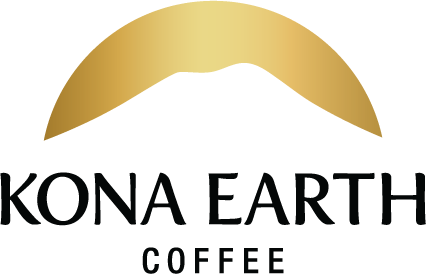When it comes to your daily cup of coffee, have you ever considered where your beans come from? Or how they are grown? With tariffs impacting imports across every industry, now is a good time to consider the benefits of American-grown coffee from Hawaii.
Kona coffee from Hawaii's Big Island is renowned for its exceptional quality and has a distinguished reputation as one of the world's finest-tasting specialty coffees. However, several other benefits extend beyond superior taste. Let's explore the top 5 reasons why choosing American-grown coffee from Hawaii is a wise choice.

Kona coffee farmers Steve and Joanie Wynn at Kona Earth
1. Support American Farmers
The 51st state, Hawaii is the only major coffee-producing region within the United States. According to a Hawaii Coffee Association report from 2021, "Hawaii’s unroasted coffee was valued at $102.91 million (ii), while its roasted value was more than (iii) $148.48 million." As the #2 crop in the State, 1,500 farmers tend more than 10,000 acres."
In 2024, according to a Hawaii Department of Agriculture report "Hawaii coffee farmers experienced significant crop losses in 2023-2024 season, facing challenges such as unpredicted weather, wildfires in Maui in August 2023 that destroyed agricultural land and produced crop-damaging smoke, and labor shortages. The harvest began earlier this season due to unfavorable weather conditions. Crop production was negatively impacted by invasive pests and diseases, such as the Coffee Leaf Rust (CLR) fungus and the Coffee Berry Borer (CBB), as well as drought conditions during the peak flowering stages."
Even with a decreased yield for the 2024 season, the importance of coffee growing in the Aloha State cannot be overstated. Beyond the growers themselves, an entire workforce in Hawaii and the US mainland depends on the success of this crop. Workers in industries that support farmers, such as farm equipment manufacturers, producers of farm inputs like fertilizers and sprays, and shippers that take the product, in both its green and roasted form, to roasters and consumers on the mainland. In effect, by choosing American-grown coffee from Hawaii, you're supporting local farmers and their families, as well as an entire network of American workers who rely on the industry for their livelihood.

Healthy Hawaiian coffee orchards yield exceptional quality
2. Environmental Impact
Hawaiian coffee farms adhere to strict environmental regulations, promoting sustainable farming practices. The Hawaii Department of Agriculture is active in monitoring the practices and products used by farmers within the coffee industry. HDOA also supports research to find solutions to common threats to the crop that farmers face, such as Coffee Berry Borer, a tiny beetle that destroys the seed, and Coffee Leaf Rust, a fungus that causes defoliation. By actively managing their farming practices in this way, Hawaiian coffee farmers are promoting sustainable methods that protect the environment, wildlife, and natural resources for future generations.

New labelingl law ensures transparency of Hawaiian coffee bean origin
3. Transparency and Traceability
Hawaiian coffee producers prioritize transparency and traceability in their supply chain. A recent law by the Hawaii State Legislature added new labeling standards for coffee sellers, requiring producers to print on their packages the origin of the beans and the percentage of each origin. This is particularly important for Kona coffee producers, who, for years, had to fight against Kona Blends that contain as little as 10% of beans from the region but use the Kona reputation to attract consumers and charge higher prices.
According to this article in SF Gate, "A new bill signed into law is meant to address deceptive labeling by raising the mandatory percentage of Hawaii-grown coffee to a minimum of 51% by 2027." "The percentage of Kona Coffee required for it to be labeled Kona should be 100%, but given that this is the first progress made on this in more than 30 years, it’s a huge win,” said Representative Nicole Lowen, who introduced the bill."

American coffee workers are paid a living wage.
4. Fair Labor Practices
In most large coffee-producing regions worldwide, workers are not fairly compensated and do not earn a living wage.
In contrast, American-grown coffee from Hawaii supports fair labor practices, ensuring that farm workers are treated ethically and paid fairly for their hard work. By choosing American-grown coffee, you are supporting responsible labor practices.

American-grown coffee from Hawaii has many benefits
5. Taste the Difference
- Variety: American-grown coffee from Hawaii represents a wide selection of coffee bean types, offering unique flavor profiles. Within the Arabica coffee tree family alone, numerous varietals can be found, including Kona Typica, Red Bourbon, Geisha, and Red Caturra. From bold and rich to fruity and floral, there is a Hawaiian coffee variety to suit every taste.
- Freshness and Quality: By purchasing beans directly from Kona coffee growers, you have the opportunity to experience the superior flavor of freshly roasted coffee beans. Many Kona coffee companies micro-batch roast on site and ship farm-direct. This is in contrast to coffee that is shipped from across the world, mass-produced for big-box stores, and sits on store shelves for an undetermined amount of time before it reaches your cup.
Next time you reach for your morning brew, consider the many benefits of choosing American-grown coffee from Hawaii. By supporting domestic coffee producers, you help create jobs and stimulate economic growth in rural areas. Not only will you enjoy a delicious cup of Hawaiian coffee that is made with Aloha, but you will also be supporting local farmers, protecting the environment, and making a positive impact on US-based businesses. Now, that's a great way to start the day!


